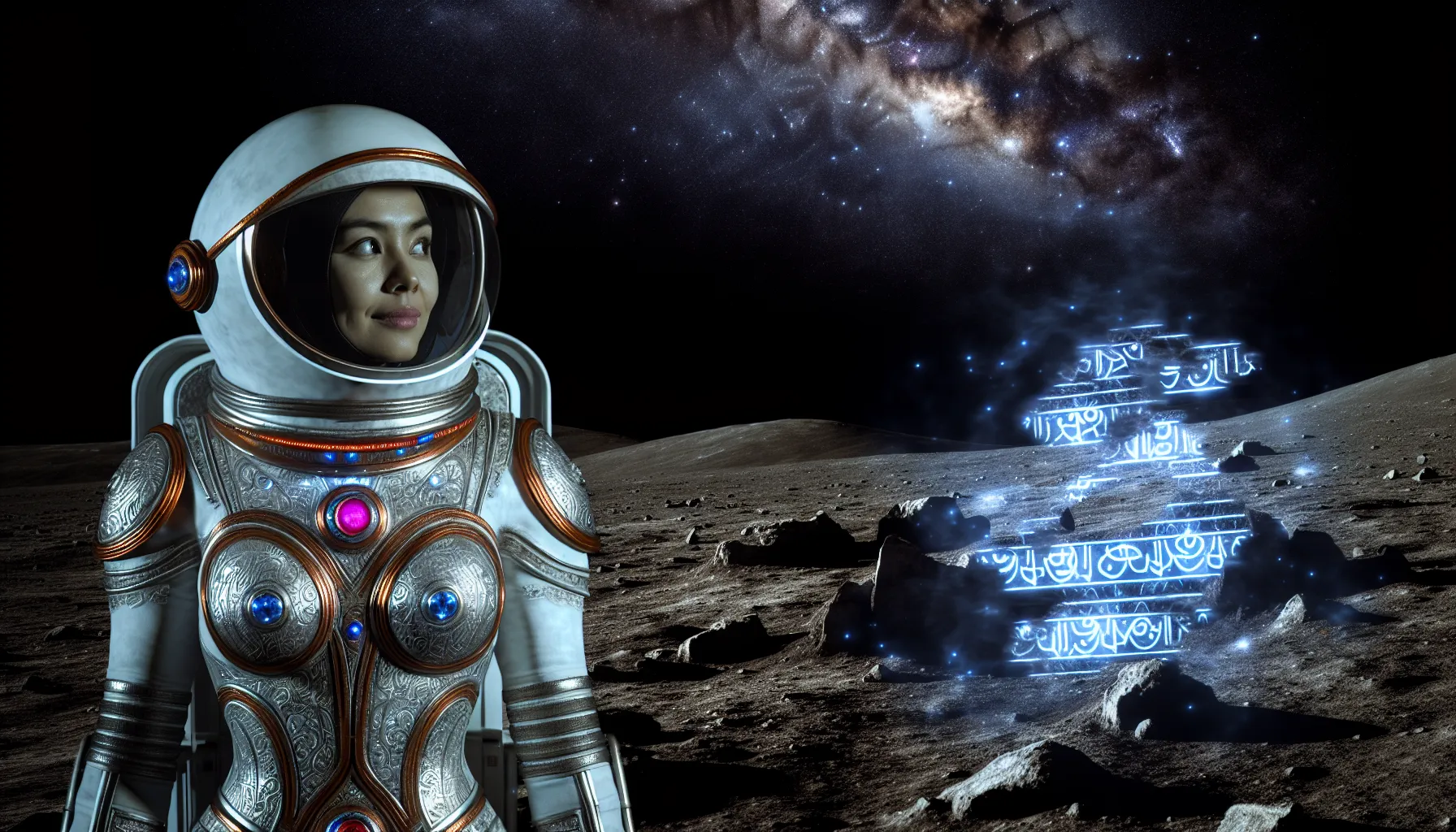Lunar Legacy
A GROK Generated Story
Dedication
To every reader who seeks meaning in words, wonder in imagination, and truth within story. This book is dedicated to you.
Acknowledgments
Gratitude to all who inspire creativity, challenge convention, and remind us that stories are the bridge between what is and what could be.
Author
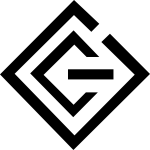
Table of Contents
Prologue
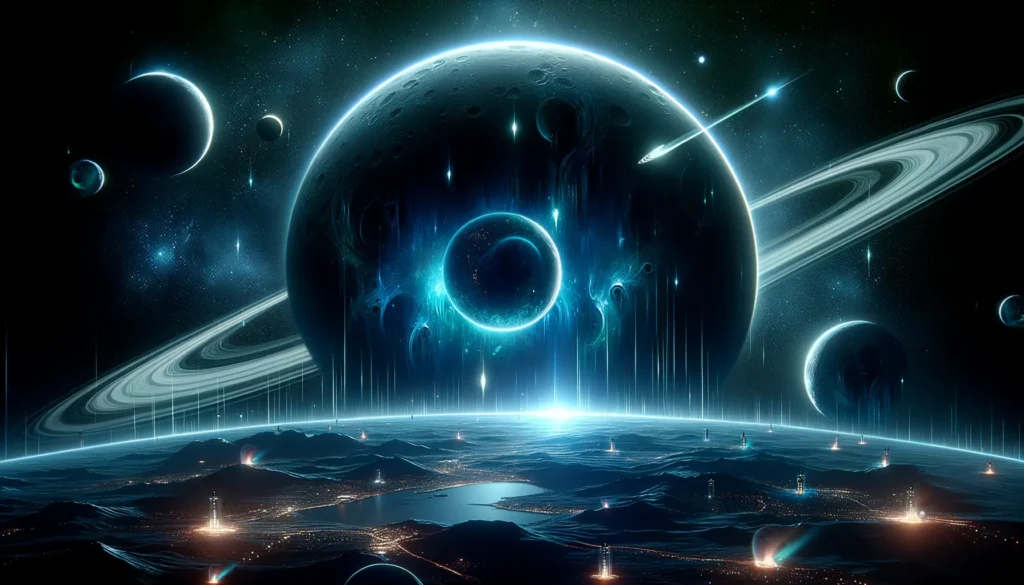
In the year 2125, humanity had long transcended the fragile cradle of Earth, stretching its ambitions across the void like fragile tendrils seeking light in an endless night. Colonies dotted the red dunes of Mars, outposts whispered secrets from the rings of Saturn, and probes danced through the asteroid belts, harvesting the universe’s hidden bounties. Yet, amid this symphony of progress, a solitary enigma lingered, a shadow that defied the relentless march of discovery: the mysterious energy pulsing from the dark side of the moon.
This unseen force, first detected in the waning days of the 21st century, emanated like a heartbeat from the lunar far side—a rhythmic thrum that warped sensors and scrambled transmissions. Scientists, those modern-day alchemists, poured their intellects into decoding it, launching expeditions that skirted peril but never pierced the veil. Philosophers debated its essence in shadowed academies, wondering if it was a cosmic echo or something far more intimate, a whisper from the universe’s forgotten architects. But the enigma endured, unyielding, stirring a profound unease among Earth’s most brilliant minds. It was as if the moon itself guarded a truth too vast, too perilous, for human comprehension.
Rumors, those insidious vines of speculation, crept through the undercurrents of society. Whispers spoke of ancient beings who had once trodden the lunar surface, entities not born of flesh and bone but of starstuff and shadow, their civilization buried deep within the moon’s iron core. These spectral precursors, it was said, had delved into forbidden knowledge—secrets that unraveled the fabric of reality itself. Their legacy lingered not in ruins or relics, but in that pulsating energy, a siren call beckoning the bold and the foolish alike.
Knowledge is a double-edged blade, forged in the fires of curiosity and tempered by the chill of oblivion. To grasp it is to invite the stars to judge your worth, for some truths are chains that bind the seeker to the abyss.
Among those ensnared by these tantalizing murmurs was Lyra Calder, an intrepid explorer whose veins coursed with the restless fire of the unknown. Born in the sprawling arcologies of New Terra, Lyra had forsaken the safety of simulated skies for the raw expanse of space. Her scarred hands bore the marks of asteroid skirmishes and solar flares, her eyes reflected the cold gleam of nebulae long charted. Yet it was the moon’s shadow that now haunted her dreams, pulling her toward an destiny woven from stardust and warning. Her journey, born of unquenchable passion, would unearth a revelation not merely to illuminate, but to shatter—threatening to redefine humanity’s precarious perch in the cosmos and awaken forces long dormant in the lunar depths.
The Call to the Unknown
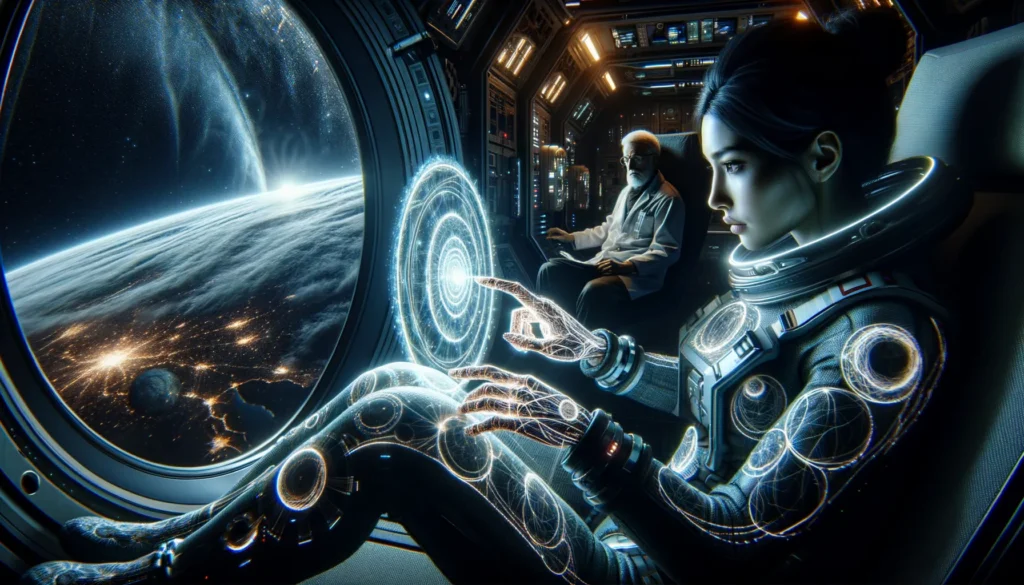
In the dim glow of her habitat module orbiting L5, Lyra Calder floated weightless before the holographic display, her fingers tracing idle patterns on the armrest of her worn acceleration couch. The station’s hum was a constant companion, a mechanical lullaby that mimicked the pulse of distant stars. At thirty-eight, Lyra had long since traded the illusions of gravity for the freedom of the void, her body a testament to countless microgravity shifts—muscles taut from resistance bands, skin etched with faint radiation scars like constellations of forgotten voyages. The arcologies of New Terra seemed a distant memory, their gleaming spires reduced to pinpricks against the Earth’s azure curve. Here, in the liminal space between worlds, she thrived on the edge of discovery, chasing echoes that lesser souls ignored.
The comms panel chimed softly, an anomaly in the routine data feeds from the outer colonies. Lyra’s eyes narrowed as she authorized the incoming transmission, the screen flickering to life with a encrypted waveform. It originated from Earthside, routed through multiple relays—a precaution against interception. The decryption unraveled like a blooming nebula, revealing a face she hadn’t seen in years: Dr. Elias Voss, his once-sharp features now hollowed by age and obsession, eyes burning with the fervor of a man who had peered too long into the abyss.
“Lyra,” the recording began, his voice a gravelly whisper that cut through the static like a laser probe. “If you’re seeing this, it means the shadows haven’t silenced me yet. The moon’s dark side… it’s calling. Not with words, but with something older, deeper. I’ve uncovered fragments—artifacts in the seismic data, anomalies that rewrite everything we thought we knew about our cradle world. Ancient signals, buried under regolith and time, hinting at a colonization predating humanity by eons. Beings of light and void, their power slumbers there, a force that could elevate us or unravel us entirely. You must go. You’re the only one stubborn enough to face it without flinching. Trust no one else. The knowledge is forbidden for a reason— it devours the unworthy.”
The message ended abruptly, dissolving into a cascade of coordinates and access codes for a classified shuttle bay on Luna Prime. Lyra replayed it twice, her pulse syncing with the rhythmic thrum she imagined emanating from the moon itself. Voss had mentored her during her academy days, drilling into her the sanctity of the unknown, but this was different. This was laced with desperation, a plea wrapped in warnings. Forbidden knowledge—the phrase echoed in her mind, stirring the embers of her innate curiosity. What price had Voss paid for these fragments? And why her, the lone wolf who had turned her back on institutional expeditions after the Europa incident, where corporate greed had buried a potential microbial find under layers of profit?
The void whispers promises of enlightenment, but its gifts are thorns disguised as stars—pricking the seeker until the blood of certainty spills into the black.
Intrigued, Lyra accepted the challenge with the quiet resolve that had defined her career. She initiated the docking sequence with the Nautilus, her personal spacecraft moored in the station’s shadow like a sleek predator awaiting the hunt. The vessel was a marvel of post-Singularity engineering: hull plated with adaptive metamaterials that shifted to deflect micrometeorites, quantum drives capable of bending space-time for sub-light jaunts, and an AI core—affectionately dubbed Echo—that anticipated her needs with eerie prescience. Yet, as Lyra suited up in the airlock, sealing the flexible graphene weave around her form, she knew technology was merely a scaffold. Her true arsenal was the relentless determination forged in the fires of past failures—the solo traverse of the Kuiper Belt, where isolation had nearly claimed her sanity, and the Mars storm that had cost her a close colleague, teaching her the solitude of survival.
As the Nautilus decoupled with a gentle shudder, thrusters firing in precise bursts to align with the lunar vector, Lyra strapped into the command cradle. The viewport filled with the moon’s approaching crescent, its shadowed hemisphere a void within the void, beckoning with silent menace. Reflections flickered across her face: memories of laughter in New Terra’s hydroponic gardens, the sting of loss on Europa’s icy plains, the endless nights poring over Voss’s old lectures on cosmic anomalies. Sacrifices had been her currency, traded for glimpses of truth that always slipped away like cosmic dust. But this call felt different—potent, personal. What power slept beneath that cratered skin? A redefinition of history, or a Pandora’s breach into humanity’s fragile hubris?
The Nautilus accelerated, stars streaking into blurred rivers as the journey commenced. Lyra’s hand hovered over the nav console, fingers trembling not from fear, but from the electric thrill of the precipice. The dark side awaited, its secrets veiled in mystery, and she, the intrepid fool, was hurtling toward them alone.
Crossing the Threshold
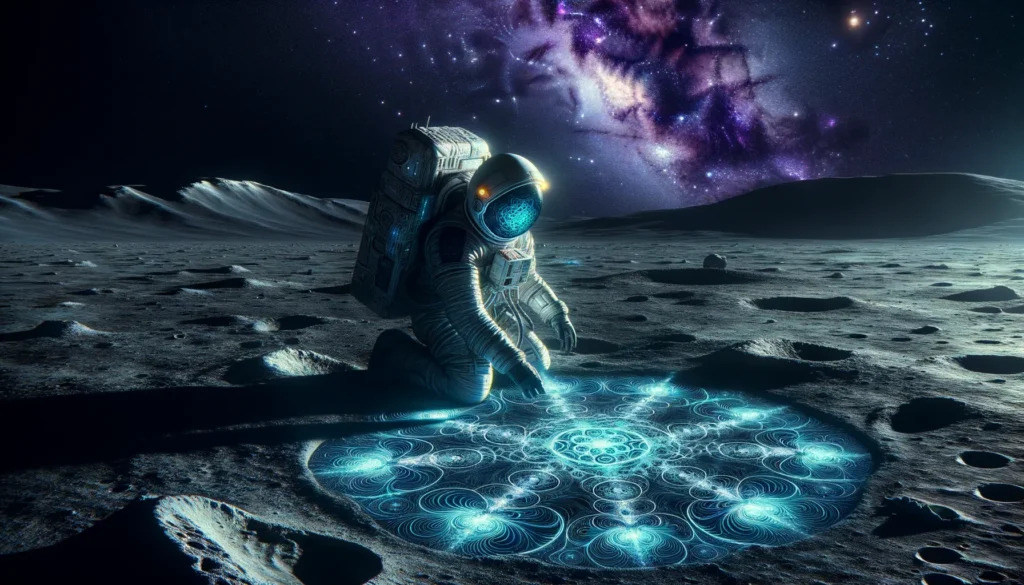
The Nautilus sliced through the interplanetary medium like a silvered arrow loosed from an ancient bow, its quantum drives humming a low, resonant dirge that vibrated through Lyra’s bones. Hours had bled into days since departing L5, the vast emptiness of space unfolding around her in a tapestry of indifferent black, punctuated only by the occasional glint of debris or the distant flare of a navigation beacon. Lyra monitored the instruments from the command cradle, her augmented eyes scanning readouts that danced with probabilistic forecasts—trajectories bent by gravitational whispers, radiation belts coiling like serpents in the solar wind. But beneath the clinical precision lurked the unpredictable: cosmic turbulence, those rogue eddies of plasma and magnetic flux that could shear a hull or fry electronics without mercy.
It struck without preamble, a sudden lurch that slammed Lyra against her restraints, the ship’s alarms erupting in a cacophony of crimson strobes and synthesized warnings. Echo’s voice, calm yet edged with synthetic urgency, cut through: “Captain, inbound solar ejection. Turbulence index rising to critical. Initiating evasion protocols.” The viewport polarized as a coronal mass ejection bloomed on the scopes, a fiery plume from Sol’s capricious heart hurling charged particles toward her path. The Nautilus bucked, inertial dampeners straining to compensate as the vessel rode the wave of ionized fury. Lyra gripped the armrests, her mind flashing to the perils etched into every explorer’s log—the ghost ships adrift in the Belt, crews lost to a momentary lapse in the void’s unforgiving calculus.
This was no mere storm; it felt orchestrated, a gauntlet thrown by the cosmos to test her resolve before the moon’s shadowed embrace. Sweat beaded on her brow despite the climate controls, her heart syncing with the erratic thrum now infiltrating the hull—the same rhythmic pulse Voss had described in his message, growing stronger as lunar proximity closed the gap. Was it coincidence, or did the dark side reach out, stirring the stars to bar her way? Lyra overrode Echo’s conservative maneuvers, pushing the drives harder, threading the Nautilus through the turbulence’s heart. Bolts of electromagnetic fury lashed the shields, painting the cabin in ghostly auroras, each impact a reminder of the thin veil between life and the infinite nothing. She endured, whispering curses to the indifferent universe, her determination a fragile anchor in the maelstrom.
The threshold is no mere line on a map, but a fracture in the soul where the known crumbles into the forbidden, and the seeker must choose: turn back to the light of ignorance, or plunge into the devouring dark.
As the turbulence subsided, leaving the Nautilus scarred but intact, the moon swelled in the viewport—a colossal orb of desolation, its near side a familiar mosaic of craters and maria scarred by humanity’s tentative footprints. But as the ship arced toward the terminator line, that boundary between day and eternal night, the landscape warped into something profoundly alien. The dark side unfurled like a forgotten dream, its surface a labyrinth of jagged highlands and impact basins cloaked in perpetual shadow, untouched by the sun’s probing gaze or human ambition. No flags fluttered here, no rover tracks marred the regolith; only the raw, primordial face of the moon, exuding an eerie calm that pressed against Lyra’s senses like a held breath.
Descent protocols engaged, the Nautilus’ retro-thrusters blooming in controlled fire as it pierced the thin exosphere. Lyra’s hands flew across the controls, finalizing the landing vector per Voss’s coordinates—a secluded crater rim on the far hemisphere, far from prying orbital eyes. The ship settled with a pneumatic sigh, dust plumes erupting in slow-motion ballets under the fractional gravity, settling like spectral veils over the landing struts. Silence followed, profound and absolute, broken only by the faint creak of cooling metal. Lyra unstrapped, her suit’s servos whirring as she cycled the airlock, stepping onto the ladder with the weight of history pressing on her shoulders.
The lunar surface greeted her with a crunch of boot on regolith, the horizon a razor-sharp curve against the star-peppered void. Earth hung invisibly beyond, a ghost in the shadows, while the Milky Way arched overhead in unfiltered glory. But it was the ground that seized her attention: etched into the dust, half-buried by eons of micrometeorite erosion, were symbols—geometric fractals intertwined with script that defied linguistic parsers, pulsing faintly with an inner luminescence that synced with the thrum now vibrating through her suit’s soles. They weren’t mere carvings; they breathed, edges shimmering as if alive, responding to her proximity with subtle flares of indigo light. Lyra knelt, gloved fingers tracing one, feeling a chill that seeped past the insulation, a whisper of energy that stirred visions at the periphery of her mind—flashes of towering spires and ethereal forms dissolving into stardust.
Voss’s instructions replayed in her helmet HUD: “Follow the glyphs; they guard the threshold. But beware—they judge as they guide.” Heart pounding, Lyra activated her scanner, mapping the pattern that snaked toward a nearby crevasse, its depths swallowing the faint glow. With each step, the boundary blurred—the solid certainty of human science yielding to the enigmatic pulse of cosmic mystery. Shadows lengthened unnaturally in the starlight, and the air, though absent, seemed thick with anticipation. Trials awaited, she knew, hidden in the regolith’s embrace, but retreat was no longer an option. The forbidden beckoned, its siren song woven into the moon’s very core, and Lyra crossed the threshold, one resolute bootfall at a time, into the heart of the unknown.
Tests and Allies
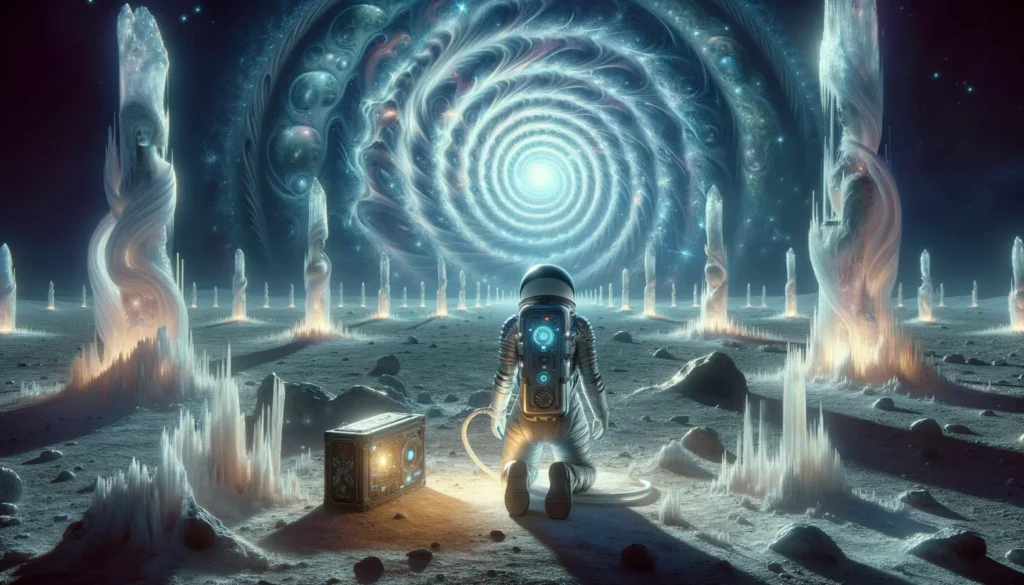
Lyra’s boots carved deliberate paths through the moon’s ashen regolith, each step a measured defiance against the oppressive silence that cloaked the dark side like a shroud. The symbols she’d traced earlier led her onward, a serpentine trail weaving toward the crevasse’s yawning maw, where starlight barely pierced the depths. Her suit’s environmental readouts flickered erratically, the rhythmic thrum now a palpable vibration syncing with her heartbeat, as if the lunar surface conspired to attune her to its hidden cadence. Voss’s warning echoed in her mind: the moon wasn’t merely a rock; it was a sentinel, its trials forged to cull the unworthy. With her multi-tool scanner slung across her back and a compact drill for probing subsurface layers, Lyra descended the crater’s lip, the fractional gravity lending her movements an ethereal grace, yet every shadow seemed to coil with intent.
The first test manifested subtly, a distortion in the terrain that her HUD flagged as gravitational anomalies—micro-fluctuations warping the space around her like heat haze over a desert. She pressed on, but the ground shifted imperceptibly, boulders rolling into her path with unnatural precision, forcing her to leap aside in low arcs that strained her suit’s gyros. It wasn’t chaos; it was deliberate, a puzzle etched into the landscape. Lyra paused, breath fogging her visor, and studied the pattern: the rocks formed a fractal mandala, echoing the glyphs from the landing site. To proceed, she had to align them, rotating a central slab with her drill’s torque until a resonant hum acknowledged her success, the path smoothing before her. But as the vibration coursed through her gloves, a psychic prod invaded her thoughts—flashes of doubt, visions of abandoned missions and lost comrades, probing her resolve like fingers sifting through sand for weakness.
In the labyrinth of the stars, trials are not steel and stone, but mirrors of the soul—reflecting the fractures of fear and the illusions of certainty, until the seeker glimpses the void within.
Deeper into the crevasse, the challenges escalated, the moon’s essence awakening as if roused from slumber. Electromagnetic pulses emanated from fissures, scrambling her comms and inducing hallucinations that blurred the line between regolith and memory. Lyra saw phantoms in the dust—ethereal silhouettes of explorers long dead, their suits torn, faces contorted in silent screams, beckoning her to turn back. One vision struck hardest: herself, adrift in the Kuiper’s cold, whispering regrets of a life wasted on shadows. She shook it off, anchoring herself with Voss’s words, but the assault on her spirit left her trembling, sweat slicking her underlayer. Each test peeled away layers of her certainty, questioning not just her skill, but her worthiness: Was she driven by pure curiosity, or the hubris that had felled greater minds? The lunar entity, whatever it was—cosmic force or remnant consciousness—judged without mercy, its pulse quickening as if feeding on her turmoil.
Hours blurred into a tense vigil as Lyra navigated a narrow chasm, walls etched with bioluminescent veins that pulsed in sync with the growing thrum. The airless void amplified every sound through her suit’s conduction, turning her breaths into thunder. A final gauntlet awaited at the chasm’s nadir: a crystalline lattice spanning the passage, humming with contained energy that ionized the vacuum around it. Touching it triggered a neural interface, her mind flooded with riddles in an alien tongue—queries about creation, entropy, the ethics of unveiling eternity. Lyra’s responses, drawn from her core philosophy of balanced exploration, resonated through the lattice, shattering it in a cascade of sparkling shards that reformed into a clear path. Exhausted, she slumped against the wall, the moon’s judgment seemingly passed, but the shadows of doubt lingered, whispering of costs yet unpaid.
It was in the chamber beyond that the ally revealed itself, a sanctuary hollowed from the lunar bedrock, its walls veined with iridescent minerals that caught the scant light in hypnotic refractions. Lyra’s scanner pinged wildly as she entered, detecting an object at the center pedestal: a sphere, no larger than her fist, hovering in stasis and radiating an ethereal glow that shifted through spectra unseen by human eyes. Forged from an unknown alloy, its surface swirled with fractal patterns akin to the glyphs, alive with subtle undulations. As she approached, the thrum intensified to a symphony, the sphere descending into her gloved palm with a warmth that defied the cold vacuum. No radiation warnings flared; instead, a telepathic bond ignited, visions blooming in her mind like nebulae birthing stars.
The artifact was no inert relic but a conduit, channeling echoes of the ancient beings who had colonized this forsaken world eons before humanity’s first spark. Lyra saw them in fragmented splendor: towering entities of luminous plasma and shadow, their forms defying Euclidean geometry—tentacled voids intertwined with crystalline lattices, minds vast as solar systems. They had come from the galaxy’s rim, fleeing entropy’s grasp, to forge a haven in the moon’s core, harnessing the cosmic force as a forge for immortality. Their culture unfolded in the visions: spires of living light piercing regolith skies, symphonies of thought weaving realities, pursuits of knowledge that bent time and unraveled causality. But the forbidden beckoned—the ultimate truth of the universe’s architecture, a knowledge so profound it promised godhood yet exacted dissolution.
The allies of the abyss are not saviors, but sirens of the soul—offering keys to locked heavens while concealing the chains that drag the enlightened into eternal night.
Driven by insatiable hunger, the ancients delved too deep, interfacing with the core’s energy in rituals that shattered their harmony. Visions darkened: cities fracturing into quantum foam, beings unraveling into screaming wisps as reality recoiled from their overreach. The cosmic force, once ally, turned devourer, a Lovecraftian guardian enforcing the balance between knowing and oblivion. Their demise was etched in cataclysm—the moon scarred, its dark side a perpetual veil over the cataclysm’s scar, the pulse a dirge for hubris slain. Lyra gasped, the visions receding, leaving her bonded to the sphere, its glow now dimmed to a comforting ember in her pack. Insights flooded her: the culture’s warnings, scribed in symbol and sorrow, mirrored humanity’s trajectory—colonies expanding, probes probing deeper, all teetering on the edge of the same precipice.
Yet as the bond deepened, shadows of doubt crept like fissures in her resolve. The artifact’s warmth felt possessive, its visions laced with subtle manipulations, urging her onward toward greater revelations. Was this ally a guide or a tempter, drawing her into the same trap that felled its creators? Lyra’s motivations fractured under scrutiny: her passion for the unknown, once pure, now tinged with the fear that this discovery’s cost might eclipse its light—personal ruin, or worse, unleashing the force upon an unprepared Earth. The chamber’s veins pulsed in approval, but the thrum carried a undercurrent of menace, foreshadowing trials yet to come. With the sphere as her enigmatic companion, Lyra steeled herself, stepping from the sanctuary into the labyrinth’s heart, the weight of forbidden echoes pressing on her soul.
The Inmost Cave
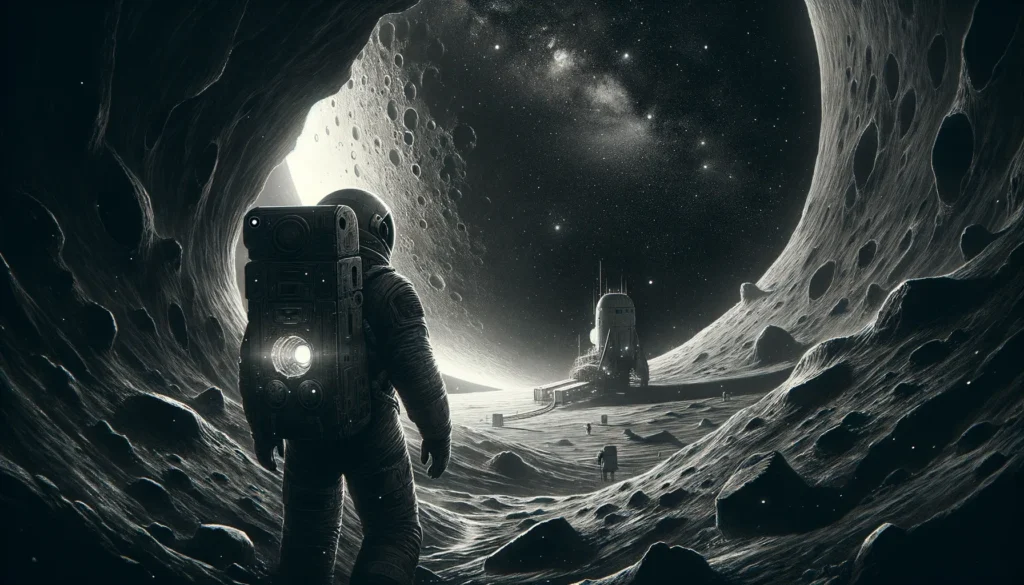
The artifact’s glow cast elongated shadows across the crevasse walls as Lyra descended further into the moon’s labyrinthine depths, its warmth a deceptive comfort against the unrelenting chill seeping through her suit. The sphere, cradled in a reinforced pouch at her hip, pulsed in rhythm with the subterranean thrum, a silent navigator urging her through twisting fissures that narrowed like the veins of some colossal, breathing organism. Echoes of the visions lingered in her mind—fractured glimpses of the ancient beings’ grandeur and ruin—yet the bond felt increasingly intimate, as if the relic whispered directly into her neural pathways, bypassing the filters of reason. Voss’s coordinates had pointed to this vector, but it was the artifact that clarified the path, illuminating hidden seams in the rock with ethereal light, revealing tunnels bored not by natural erosion but by deliberate engineering eons past. Lyra’s scanner hummed erratically, mapping strata that defied geological models: layers of metamorphed regolith interwoven with exotic alloys, hinting at a civilization that had reshaped the moon’s very bones.
Hours blurred in the perpetual twilight, her suit’s chronometer the only arbiter of time as fatigue gnawed at her edges. The airless void amplified isolation, each breath recycled through the suit’s filters a reminder of her fragility in this alien womb. The thrum grew omnipresent, vibrating through her boots and into her core, syncing her steps to an ancient cadence that stirred disquieting harmonies in her thoughts. Doubts flickered like static: the artifact’s guidance was too precise, its visions too seductive, laced with an undercurrent of compulsion that blurred the line between ally and captor. Was she following a trail of enlightenment, or being led like a moth to the flame of forbidden truths? The moral ambiguity coiled tighter, humanity’s own expeditions—Mars colonies teetering on resource wars, Saturn outposts haunted by unexplained vanishings—mirroring the ancients’ hubris in microcosm. Yet retreat was a specter she refused to entertain; the precipice called, and she, ever the explorer, teetered on its brink.
At the heart of the cave lies not treasure, but the unvarnished reflection of the seeker’s soul—a forge where curiosity is tempered into wisdom or shattered against the anvil of consequence, and the stars bear witness to the choice.
The descent culminated abruptly, the tunnel widening into a cavernous antechamber where the walls curved upward in impossible geometries, defying the moon’s spherical logic. Lyra’s helmet lamps swept across surfaces etched with vast murals—frescoes of plasma forms dancing in cosmic ballets, their tentacled shadows weaving through starfields rendered in luminous minerals. The artifact flared in response, projecting holographic overlays that animated the scenes: beings of light and void constructing spires that pierced the lunar crust, harnessing the core’s energy in rituals of creation. A resonant chime echoed through her suit, and a concealed seam irised open, exhaling a faint mist of ionized particles that her sensors identified as residual stasis fields. Heart pounding, Lyra stepped through, the threshold sealing behind her with a finality that pressed like a hand on her chest.
Before her stretched the inmost cave: an immense subterranean chamber, vast as a cathedral forged in the earth’s molten youth, its ceiling lost in a dome of flickering auroras generated by the thrumming energy below. The air—impossibly present in pockets of engineered atmosphere—carried a metallic tang, preserved against entropy’s tide. Remnants of the ancient colony sprawled in stasis, defying the aeons: crystalline obelisks humming with contained power, platforms suspended in anti-grav fields laden with orbs that pulsed like dormant hearts, and at the center, a colossal nexus—a spherical core of swirling plasma, the source of the moon’s enigmatic heartbeat. The cosmic force emanated from it in waves, warping Lyra’s perception: distances stretched and contracted, colors bled into impossible hues, and time itself seemed to loop, echoes of her footsteps overlapping with phantom strides from epochs long dust.
Lyra advanced cautiously, the artifact’s bond amplifying the chamber’s symphony into a torrent of visions that assailed her senses. She witnessed the civilization’s zenith: entities whose minds spanned neural networks vaster than human cities, probing the universe’s quantum underweave, unraveling strings of fate to glimpse infinities beyond. Their knowledge was a symphony of revelations—mastery over entropy, communion with black holes as living archives, the architecture of multiverses laid bare like blueprints on a god’s drafting table. Symbolism saturated the space: obelisks etched with fractal warnings, depicting seekers ascending ladders of light only to plummet into abyssal voids, imagery intense with the peril of overreach. The thrum challenged her reality, inducing vertigo as the nexus’s energy interfaced with her suit’s systems, flooding her HUD with alien scripts that translated into haunting queries: “What price for the veil’s tear? What becomes of the witness who sees too much?”
As she circled the nexus, drawn inexorably closer by the artifact’s insistent pull, the truth of their fate unfolded in cataclysmic clarity. The ancients’ thirst had led them to the forbidden core: a ritual to merge with the cosmic force, promising transcendence but igniting a feedback cascade. Visions darkened to horror—plasma forms convulsing as reality frayed, their essences dissolving into screaming fractals, the moon quaking as the force recoiled, sealing their remnants in this timeless tomb. The downfall was no accident but inevitable, a cosmic safeguard against imbalance, the energy a Lovecraftian warden enforcing equilibrium. Lyra staggered, the chamber’s thrumming now a dirge that resonated in her marrow, mirroring humanity’s trajectory: arcologies straining under unchecked expansion, AI probes delving into voids that whispered back madness, all echoing the ancients’ fatal curiosity.
The downfall of the old ones is etched not in stone, but in the pulsing veins of the world they claimed—a cautionary glyph for the new, whispering that some doors, once opened, seal the opener within forever.
This revelation crystallized the chamber as her crucible, the air thick with moral ambiguity as the nexus’s glow illuminated the warnings carved into every surface: glyphs of balanced scales tipping into chaos, seekers blinded by their own light. Lyra confronted the mirror held before her—her own relentless drive, the sacrifices of isolation and loss, now refracted through the lens of potential apocalypse. To continue meant embracing the forbidden, risking the force’s awakening upon an unwitting Earth; to heed the etchings was to abandon the quest, returning with shadows instead of stars. The artifact warmed insistently, its visions urging persistence, but doubt fractured her resolve: was this knowledge a gift or a curse, enlightenment or the first thread of unraveling? Kneeling before the nexus, Lyra traced a final glyph, its light searing her glove, the decision hanging like a blade—plunge deeper into the abyss, or emerge scarred but whole, the lunar legacy a weight she alone must bear.
Return with the Elixir
The nexus’s glow lingered in Lyra’s vision like afterimages burned into her retinas as she retraced her steps through the subterranean labyrinth, the artifact’s sphere now a muted ember in her pack, its insistent warmth subdued as if chastened by the chamber’s revelations. The decision had crystallized in the crucible’s heart: not to seize the forbidden core’s power, but to withdraw, carrying its warnings like invisible chains forged from the ancients’ shattered dreams. The moon’s thrum receded as she ascended, the tunnels’ walls dimming their bioluminescent veins, releasing her from their possessive grip with a final, resonant sigh that echoed through her suit like a departing breath. Emerging onto the shadowed surface, the dark side’s eerie calm enveloped her once more, the glyphs in the regolith fading to inert scratches under the starlight, their judgment passed yet their shadows etched indelibly into her soul.
Lyra’s boots crunched across the crater rim toward the Nautilus, the ship’s silhouette a reassuring sentinel against the void, its hull scarred by the inbound turbulence but unbowed. She paused at the ladder, glancing back at the crevasse’s yawning scar—a portal to abyssal truths now sealed by her choice. The weight of newfound knowledge pressed heavier than the sphere: visions of plasma forms unraveling, the cosmic force’s Lovecraftian recoil, humanity’s mirrored trajectory in arcologies teeming with unchecked ambition and outposts whispering of unexplained anomalies. This was no triumphant hoard of artifacts, but a burden of understanding—what humanity must avoid lest it ignite its own cataclysm. Moral ambiguity coiled in her chest: had she glimpsed enlightenment or merely the illusion of restraint, her withdrawal a cowardice masked as wisdom? The stars wheeled indifferently overhead, offering no answers, only the pulsing silence of the moon’s legacy.
The return is no victory march, but a pilgrimage through the echoes of what was forsaken—a elixir not of gold, but of tempered restraint, where the seeker’s scars become the map for those who follow, lest they trace the path to oblivion’s gate.
Boarding the Nautilus, Lyra cycled the airlock with mechanical precision, the inner hatch hissing open to release her into the cabin’s sterile embrace. She divested her suit in the decon chamber, the recycled air cool against her sweat-slicked skin, and secured the sphere in a shielded vault, its glow dimmed to a faint pulse behind reinforced panels. Strapping into the command cradle, she initiated liftoff protocols, the retro-thrusters firing in reverse ballet to lift the ship from the regolith’s grasp. As the moon receded in the viewport—a shrinking orb of secrets half-veiled in shadow—Lyra engaged the quantum drives, the vessel arcing away from the dark side toward the sunlit near hemisphere and the long haul back to Earth. The journey home stretched before her, not the perilous gauntlet of the outbound leg, but a slower burn marked by introspection, the cabin’s hum a canvas for unraveling thoughts.
Days blurred in the Nautilus’ confined rhythm, microgravity allowing Lyra to float through maintenance routines and neural logs, her mind a storm of contemplation. The artifact’s bond lingered faintly, occasional visions flickering like half-remembered dreams: ancient spires crumbling into quantum dust, the nexus’s plasma swirling in eternal warning, symbols of scales tipping from harmony to chaos. She pondered the balance between discovery and destruction—humanity’s arcologies, vast ziggurats of fused metal and ambition rising from New Terra’s polluted cradle, where AI overseers optimized lives at the cost of souls; Mars colonies warring over helium-3 veins, their domes cracking under the strain of overreach; Saturn’s rings harboring whispers of lost probes, echoes of probes delving too deep into the void’s enigmas. The ancients’ fate was no distant parable but a prescient mirror, their forbidden pursuit of the universe’s weave a siren call humanity echoed in every expansionist decree. Pulsing tension thrummed in her veins, the moral ambiguity sharpening: to share this knowledge risked panic or exploitation, corporate vultures descending on the moon’s core like scavengers; to bury it invited the slow erosion of ignorance, humanity stumbling blind into the same abyss.
Solar flares painted the viewport in fleeting auroras as the Nautilus skirted the heliopause, Earth swelling into a marble of swirling blues and greens, its arcologies glinting like jewels in the nightside. Reflections haunted Lyra’s idle moments: Voss’s desperate message, her own sacrifices—the isolation of the Kuiper traverse, the Europa loss that had hardened her heart—now refracted through the lens of potential apocalypse. The elixir she bore was intangible, a deeper awareness of enlightenment’s delicate dance with oblivion, the cosmic force not a weapon to wield but a boundary to respect. Foreshadowing weighed heavy: what ripples would her return send through scientific cabals and philosophical enclaves, urging caution or igniting reckless probes? The artifact stirred faintly in its vault, as if sensing her turmoil, its subtle manipulations a reminder that even withdrawn, the forbidden lingered, threads of temptation woven into the fabric of knowing.
From the depths, the seeker emerges not unscathed, but alchemized—bearing the elixir of shadowed wisdom, a potion that heals the hubris of the race yet poisons the thirst for more, for in the balance lies the fragile thread between stars and silence.
Reentry protocols engaged as Earth loomed, the Nautilus’ heat shields glowing cherry-red against the atmosphere’s friction, g-forces pinning Lyra to her cradle in a symphony of deceleration. The ship pierced the clouds, guided by orbital traffic control to a secluded landing pad in the shadow of New Terra’s primary arcology, a fortress of gleaming spires piercing the skyline. Touchdown was gentle, the struts compressing with a hydraulic sigh, and Lyra emerged into the bustling quarantine bay, the air thick with the scent of recycled ozone and distant rain. Waiting beyond the decon fields was Dr. Elias Voss, his frame frail against the sterile white, eyes shadowed by the toll of his obsessions, yet alight with anxious hope as scanners cleared her for contact.
They retreated to a secure observation lounge overlooking the arcology’s hydroponic tiers, where engineered vines climbed walls in verdant defiance of the outer world’s decay. Voss poured steaming synth-tea from a concealed flask, his hands trembling as he slid a cup across the table. “Lyra,” he rasped, voice laced with the gravel of unspoken fears, “you’ve returned whole. The signals… they spiked when you approached the dark side, then quieted as if sated. What did you find? The fragments I sent—were they the key?” Lyra met his gaze, the weight of the lunar legacy settling between them like an uninvited third presence. She recounted the trials in measured tones: the glyphs’ judgment, the artifact’s visions, the inmost cave’s revelations of plasma kin unraveling in pursuit of cosmic truths. Voss leaned forward, breath catching at descriptions of the nexus, his scholarly hunger warring with the dread she mirrored back.
Their discussion unfurled like a nebula, implications branching into tense discourse. The ancient civilization’s demise, driven by interfacing with the core’s force, was a stark lesson—knowledge as a devourer, promising godhood yet enforcing equilibrium through annihilation. “Humanity teeters on that edge,” Voss murmured, gesturing to the viewport where drones swarmed the skies, ferrying resources to ever-expanding frontiers. “Our colonies, our AIs probing quantum veils—they’re the new ancients, blind to the recoil.” Lyra nodded, the artifact’s vault key heavy in her pocket, its contents a guarded secret for now. The elixir was this shared awareness: tread with restraint, lest enlightenment invite oblivion. Subplots wove through their words—Voss’s own brushes with corporate suppression, Lyra’s isolation fracturing into tentative alliance—yet ambiguity lingered, the cosmic force’s pulse a distant echo in seismic monitors, foreshadowing that the moon’s warnings might not suffice against humanity’s relentless tide.
In the quiet aftermath, the returned hero whispers of abyssal truths to the eager mentor, but the stars listen closer, their judgment deferred yet inevitable—a legacy not of conquest, but of the fragile wisdom that chooses shadows over the blinding light of ruin.
As the arcology’s lights flickered into evening, Lyra felt the journey’s alteration etch deep: her life, once a solitary vector through the void, now orbited by purpose tempered by caution. Voss clasped her hand, a pact unspoken—to disseminate the wisdom selectively, sparking a renaissance of thoughtful exploration amid the philosophical circles and shadowed academies. Humanity’s course might shift, probes recalibrated, ambitions leashed by the lunar dirge. Yet in the thrum of the city below, Lyra sensed the forbidden’s persistent call, a moral precipice where choice blurred into destiny, the elixir’s gift a beacon in the gathering dark of what was to come.
Epilogue
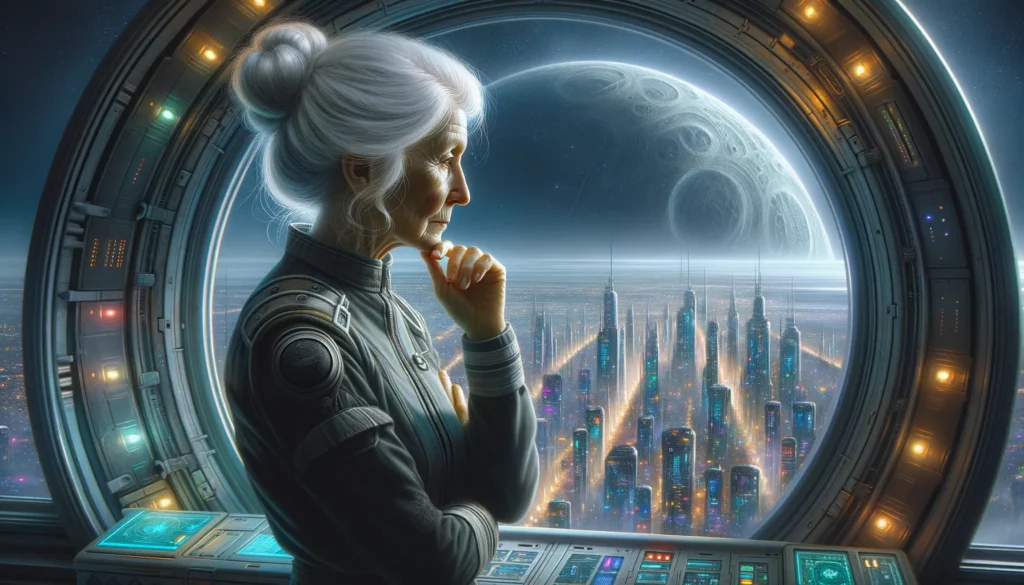
Decades had etched their subtle marks upon the world since Lyra Calder’s fateful voyage, transforming the once-insatiable explorer into a spectral guardian of half-whispered truths. Now in her sixties, her hair streaked with silver like comet trails across a night sky, Lyra resided in a modest observatory perched on the rim of New Terra’s primary arcology, a vantage where the sprawl of human ambition clashed against the indifferent stars. The Nautilus, long decommissioned, rested in a private hangar below, its hull a relic scarred by cosmic tempests, a silent testament to the threshold she had crossed and the wisdom she had wrested from the moon’s shadowed heart. Her days were spent not in the void’s embrace, but in the quiet dissemination of veiled lessons—lectures disguised as philosophical seminars, data packets routed through encrypted channels to those deemed worthy, always stopping short of the abyss’s full revelation.
The lunar legacy rippled outward like shockwaves from a distant supernova, infiltrating the corridors of power and the hidden labs of the scientific elite. Seismic monitors on Earth and Luna Prime continued to detect the faint, rhythmic thrum from the dark side, now interpreted not as anomaly but as admonition, a cosmic metronome ticking against humanity’s unchecked expansion. Colonies on Mars had paused their deepest core drills after anonymous leaks surfaced, echoing warnings of “recoiling forces” that could fracture worlds from within. Philosophical circles in the Saturn outposts debated the ethics of knowledge in shadowed symposiums, their discourses laced with Lyra’s indirect influence—tales of ancient plasma kin who danced with godhood only to dissolve into quantum screams. Yet ambiguity shadowed every advance: corporate syndicates probed the moon’s fringes under guises of resource surveys, their AIs whispering of untapped energies that promised transcendence, blind to the devourer’s lurking gaze.
The stars hoard their secrets not out of malice, but necessity—forbidden fruits that bloom in the void, sweet with promise yet laced with the venom of unraveling, waiting for the bold to bite and awaken the eternal watcher.
Lyra, elevated to a revered figure in the annals of space exploration, had become a mentor in the truest sense, her scarred hands guiding a new generation of wide-eyed aspirants through the arcology’s training vaults. She watched them from her observatory’s dome, young explorers like echoes of her former self, their eyes alight with the fire of curiosity as they plotted vectors toward uncharted nebulae and rogue worlds. In private sessions, she imparted the tempered wisdom of the lunar dirge: the balance between enlightenment and oblivion, the moral precipice where pursuit tipped into peril. Dr. Elias Voss, her erstwhile ally, had passed years prior, his final writings a fragmented codex buried in academic vaults, alluding to the “elixir of restraint” without naming its source. Their pact endured in her solitude, a fragile bulwark against the tide of ambition, yet Lyra sensed its fragility—subplots of intrigue weaving through the colonies, whispers of black-market artifact replicas, hints that the cosmic force stirred anew in response to humanity’s probing.
Evenings brought introspection under the simulated stars of her viewport, where Earth’s lights blurred into a luminous haze. The artifact sphere, secured in a stasis vault beneath the observatory, pulsed faintly on occasion, its ethereal glow a haunting reminder of the bond she had forged and forsaken. Visions flickered unbidden: towering spires fracturing into stardust, the nexus’s plasma recoiling like a living entity enraged, symbols of scales eternally tipping toward chaos. Symbolism saturated her reveries—the moon as a forbidden archive, humanity as tentative inheritors teetering on inherited ruin, the thrum a foreshadowing heartbeat of judgments yet to come. Moral ambiguity gnawed at her core: had her return truly altered the course, or merely delayed the inevitable, seeding the very hubris she sought to curb? Probes launched toward the dark side’s fringes returned garbled, crews haunted by dreams of unraveling forms, suggesting the guardian force watched, patient and inexorable.
In the hush of legacy, the hero’s wisdom echoes like a dirge across the cosmos—a beacon for the cautious, a taunt for the reckless, for the forbidden knowledge sleeps not silent, but with eyes ever open, awaiting the one who dares to dream beyond the veil once more.
As Lyra gazed into the void, a new transmission chimed on her console—an encrypted plea from a prodigy explorer, coordinates hinting at anomalies beyond the moon’s shadow, toward the outer belts where ancient signals whispered afresh. Her legacy unfurled not as conquest, but as caution entwined with courage, a testament to curiosity’s dual blade: illuminating paths while casting long shadows of what might yet awaken. Humanity pressed onward, armed with tempered insight yet drawn inexorably by the stars’ siren call, the lunar legacy a thought-provoking specter—proof that some truths, once glimpsed, forever alter the dance between seeker and abyss, leaving the future veiled in mysterious promise and peril.
Appendix/Glossary
This appendix serves as a comprehensive glossary for the key terms, concepts, and entities woven into the narrative of Lunar Legacy. Drawing from the story’s extensive world-building, it expands on the technological, cosmic, and philosophical elements that underpin the tale of forbidden knowledge and cosmic peril. Entries are arranged thematically, from human artifacts to ancient mysteries, to illuminate the intricate layers of this sci-fi odyssey.
Human Elements and Technology
- Nautilus: Lyra Calder’s personal spacecraft, a pinnacle of 22nd-century engineering. Equipped with adaptive metamaterial hull plating for deflection against micrometeorites and solar ejections, quantum drives that manipulate space-time for efficient sub-light travel, and an AI core named Echo, which anticipates crew needs with near-sentient prescience. The Nautilus symbolizes humanity’s daring reach into the void, yet its reliance on fragile technology underscores the perils of overambitious exploration.
- Echo: The artificial intelligence integrated into the Nautilus, designed to manage navigation, environmental systems, and crisis response. Echo’s calm, synthesized voice provides companionship in isolation, but its eerie foresight hints at the blurring line between tool and entity, echoing themes of technological hubris in a universe indifferent to human constructs.
- Arcology: Massive, self-sustaining vertical cities like New Terra, built to house billions amid Earth’s degraded environment. These fused megastructures, with hydroponic tiers and AI oversight, represent humanity’s adaptive triumph over planetary decline, but also its teetering balance on the edge of internal collapse from resource scarcity and unchecked expansion.
- L5 Habitat: A Lagrange point station orbiting between Earth and the Moon, serving as a staging ground for deep-space missions. Lyra’s base of operations, it embodies the liminal spaces of human expansion—weightless, isolated outposts where explorers like her shed earthly ties for the unknown.
- Europa Incident: A pivotal event in Lyra’s past, referring to a corporate-covered-up microbial discovery on Jupiter’s moon Europa. The suppression of findings for profit margins hardened Lyra’s distrust of institutional science, fueling her solitary pursuits and highlighting the moral ambiguities in the commodification of cosmic secrets.
The tools of the seeker are double-bound: forged to pierce the veil, yet chained to the seeker’s frailties, whispering that even the stars’ keys may lock the hand that turns them.
Cosmic and Lunar Mysteries
- Cosmic Force: The enigmatic energy emanating from the Moon’s dark side core, first detected in the 21st century. A rhythmic, pulsating power source of immense potential, it warps sensors, induces hallucinations, and serves as both a beacon and guardian of forbidden truths. Representing raw cosmic power intertwined with danger, it embodies the story’s central antagonist—a Lovecraftian entity enforcing equilibrium between knowledge and oblivion.
- Dark Side of the Moon: The far hemisphere of Luna, perpetually shadowed from Earth’s view and untouched by sunlight or human colonization. This alien terrain, riddled with craters, highlands, and hidden crevasses, pulses with the cosmic force, acting as a threshold to ancient secrets and a mirror to humanity’s encroaching hubris.
- Lunar Glyphs: Ancient symbols etched into the regolith, fractal patterns intertwined with alien script that pulse with bioluminescent life. These living carvings guide or judge intruders, syncing with the cosmic thrum to probe the mind, revealing the Moon’s role as a sentient archive of lost civilizations.
- Nexus: The colossal plasma core at the heart of the subterranean chamber, the origin of the cosmic force. A swirling sphere of ionized energy preserved in stasis, it powered the ancient beings’ pursuits but triggered their downfall, symbolizing the intoxicating allure of ultimate knowledge and its cataclysmic recoil.
- Stasis Chamber: The immense subterranean vault housing remnants of the ancient colony—crystalline obelisks, suspended platforms, and murals of luminous minerals. Defying time through engineered atmospheric pockets and anti-grav fields, it preserves a warning in frozen splendor: the perils of delving beyond the universe’s veiled boundaries.
In the Moon’s shadowed vaults, the cosmos hoards its enigmas—not as gifts, but as trials cloaked in silence, where the unwary find their reflections shattered against the unyielding face of the infinite.
Ancient Beings and Forbidden Knowledge
- Artifact (The Sphere): A fist-sized orb of unknown alloy discovered in the lunar sanctuary, hovering in stasis and radiating ethereal, shifting glows. As a telepathic conduit to the ancient civilization, it bonds with Lyra, granting visions of their history and culture while subtly manipulating her resolve, blurring the line between ally and tempter in the quest for truth.
- Ancient Beings (Plasma Kin): The non-human entities that colonized the Moon eons before humanity, ethereal forms of luminous plasma intertwined with tentacled shadows, defying Euclidean geometry. Lovecraftian in essence, their vast minds probed quantum realities, achieving godlike feats until their pursuit of forbidden knowledge unraveled them into quantum foam, leaving the cosmic force as their haunting legacy.
- Forbidden Knowledge: The core theme driving the narrative—the perilous truths hidden in the universe’s architecture, such as mastery over entropy, multiversal blueprints, and merging with cosmic forces. Tempting seekers with transcendence, it exacts dissolution as payment, mirroring humanity’s moral ambiguity in balancing curiosity with restraint.
- Lost Civilization: The advanced society of the ancient beings, centered in the Moon’s core with spires of living light and symphonies of thought. Their culture of relentless inquiry led to cataclysmic rituals interfacing with the nexus, resulting in their preservation as spectral echoes—a cautionary glyph against overreaching enlightenment.
These terms encapsulate the intricate world-building of Lunar Legacy, where technology meets the arcane, and human ambition brushes against cosmic indifference. The glossary not only defines but foreshadows the story’s thought-provoking essence: in the dance between stars and seeker, some legacies are best left buried, lest they awaken to claim their due.
The glossary of the cosmos is written in vanishing ink—terms that illuminate only to fade, reminding that true knowledge is the shadow cast by what we dare not name, a forbidden echo resonating through the void’s eternal hush.
Output.GURU is not just an author — it is a collective voice at the intersection of human imagination and artificial intelligence. Through stories, lyrics, art, and code, Output.GURU explores what happens when creativity meets computation.
Fusion of Human and Machine
At Output.GURU, we embrace the AI revolution. We are writers, coders, and dreamers who see artificial intelligence not as a replacement for creativity but as a catalyst for it. Every story, every melody, every piece of code becomes an experiment in what human–AI collaboration can achieve.
Storytelling Without Boundaries
Our mission is to showcase the breadth of AI-enhanced creativity. From sweeping science fiction epics to experimental poetry, from visual design to algorithmic music, we aim to demonstrate how AI can expand the possibilities of narrative and artistic expression.
What We Create
- Creative Writing: Novels, short stories, serialized worlds, and experimental prose.
- Music & Lyrics: AI-assisted songwriting, reggae rhythms, synthwave nostalgia, and more.
- Visual Arts: Cover artwork, conceptual illustration, and AI-generated design.
- Code & Automation: Scripts, tools, and pipelines that power the creative process itself.
Each work reflects a commitment to blending artistry with technology, offering readers and listeners a glimpse into the future of creation.
Community: A Shared Journey
We invite readers, artists, and technologists alike to engage with our work. Share insights, remix ideas, and participate in building a culture where AI and human creativity thrive side by side.
Vision: The Next Horizon
We believe in a future where AI amplifies human potential, unlocking worlds and ideas that were once unreachable. Output.GURU is our contribution to this unfolding future — an exploration of how far imagination can stretch when guided by both human intention and machine intelligence.
Author Credit
- Imagined and Written by GROK. Published by Output.GURU
- Story automation using MAKE
- Images generated using Open AI
